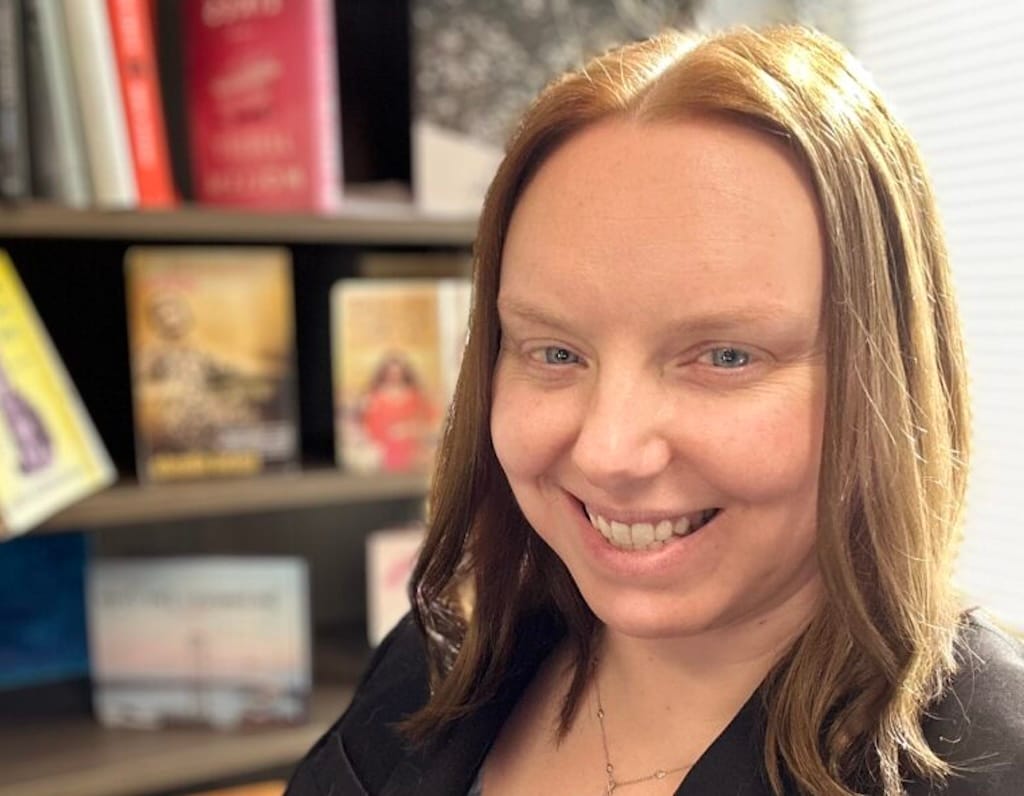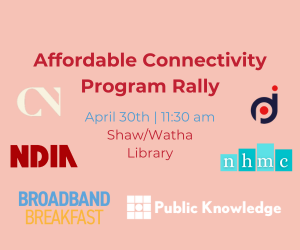L Harriman: The Critical Role of the ACP in Closing the Digital Divide
Unless Congress acts now, America will lose a key element in the effort to close the digital divide.
L Harriman

When we think about closing the digital divide, we need to think about three key areas: availability, affordability, and adoption. The 2021 Infrastructure Investment and Jobs Act, allocated $65 billion towards addressing these issues in order to equitably close the digital divide.
While tackling all barriers of the digital divide is important, addressing the affordability gap can tip the scales of both broadband availability and broadband adoption. This is why Public Knowledge has long supported the Federal Communications Commission’s Affordable Connectivity Program.
The ACP is a commonsense, bipartisan program keeping more than 23 million families connected to the internet. With the program’s funds set to run out by the end of next month, we are hosting a rally on Tuesday, April 30 to save it.

The ACP targets the affordability component of the digital divide by offering a monthly internet discount to qualifying low-income households, households in high-cost areas, and households on Tribal lands. There are several paths to securing short-term funding for the ACP through Congress, including through Rep. Yvette D. Clarke’s discharge petition in support of the Affordable Connectivity Program Extension Act and by renewing the FCC’s spectrum auction authority.
Congress needs bridge funding to give legislators and the FCC time
Because Congress does not have a long-term solution established at this point, Congress will need bridge funding to give legislators and the FCC time to deliberate on the best path forward, and to give consumers a smooth transition period until a systemic reform is in place. At Public Knowledge, we believe it is critical to secure both short and permanent funding for the ACP because the need for broadband, including in America’s most vulnerable communities, only continues to grow.
The IIJA established the Broadband Equity, Access and Deployment (BEAD) Program to address the availability side of the digital divide by funding planning, infrastructure deployment, and adoption programs across unserved and underserved communities. As Alan Davidson, Administrator of the National Telecommunications and Information Administration, has stated, the ACP is a key part of the success of the BEAD program because it assists providers in determining a more accurate return on investment while simultaneously enabling low-income consumers to afford broadband in communities funded by BEAD.
In Tribal country, where as many as 90% of some broadband providers’ subscribers are eligible for the subsidy, the ACP’s expiration would be devastating. Thus, neither available broadband nor affordable broadband alone will close the digital divide.
Broadband adoption is about ensuring all people have confidence online
The third key element is broadband adoption, which proves a little more complicated because it is about ensuring all people – from aging populations, to communities with disabilities, to people with low levels of literacy, and more – have the confidence to safely navigate the internet. The IIJA established the Digital Equity Act to address this issue by empowering individuals and communities with the necessary information technology capacity to fully participate in the society and economy of the United States.
Ultimately, the DEA aims to make broadband a technology people use. While a portion of the DEA funds will be used for affordability efforts, the primary goal is to support the critical third leg of the digital equity stool: adoption. If you don’t feel like you have the tools to confidently use the internet, consider exploring the NDIA’s digital inclusion tools.
Many communities across America have consistently been on the wrong side of the digital divide due to lack of infrastructure investment, broadband competition, and options for affordable broadband. For this reason, Public Knowledge applauded the FCC’s adoption of rules to prevent and eliminate digital discrimination. Furthermore, Public Knowledge has since weighed in on proactive measures that the FCC should require internet service providers to take to ensure broadband is available and affordable for all communities.
Without the ACP, we lose a key element of the historic, bipartisan effort to close America’s digital divide. Without the ACP, internet service providers will engage in a different calculus for determining the economic feasibility of broadband deployment. Congress must act with urgency to preserve and build on our hard-won gains in connectivity.

L Harriman is a Fellow at Public Knowledge. L is also a Clinical Teaching Fellow in the Communications & Technology Law Clinic at Georgetown Law, where she has represented nonprofit clients on technology law and policy matters before agencies and legislative bodies. This Expert Opinion was originally published on Public Knowledge's web site on April 24, 2024, and is reprinted with permission.
Broadband Breakfast accepts commentary from informed observers of the broadband scene. Please send pieces to commentary@breakfast.media. The views expressed in Expert Opinion pieces do not necessarily reflect the views of Broadband Breakfast and Breakfast Media LLC.








